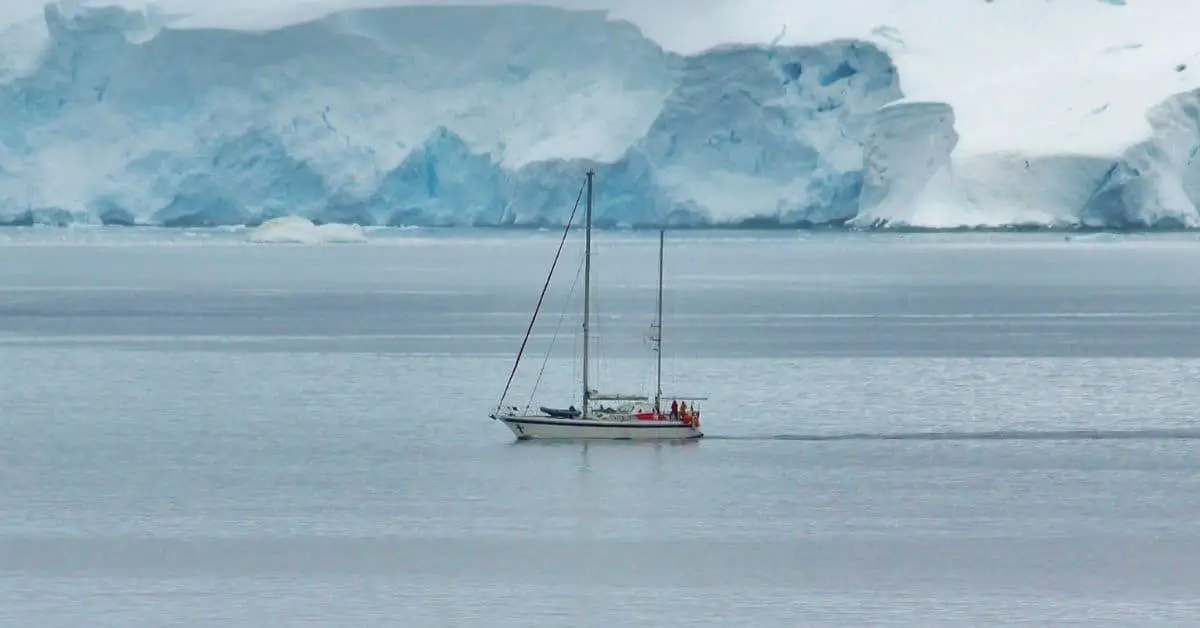No doubt about it, cool-weather boating means less traffic on the waterways, more room to sail, and incredible fishing opportunities. But before you crank the engine and shift into gear, you may want to think again. Boating in cold weather can carry some serious risks. So, how cold is too cold for boating?
Any water temperature below 70 degrees Fahrenheit should be treated with caution when boating. The biggest threat is falling into the cold water and getting hypothermia. It doesn’t take much for water to be hazardous. Even boating in relatively warm weather can be dangerous if the water is much colder than the air.
(source)
Learning about water temperature in correlation to hyperthermia will help you avoid any unnecessary risks. If you do decide to go out in cold water, you may want to stay close to shore so you can get to land quickly in case of an emergency. However, try to avoid swimming in cold water as it drains body heat very fast. Although, If it’s absolutely necessary, do it.
Having a lifejacket will buy you time, but even within just 10 minutes of being in cold water, your body may become incapable of moving efficiently. Within 30 minutes to an hour, serious hyperthermia will start to kick in, but if you don’t have a lifejacket, chances of survival up to an hour are very slim (source).
In this post, we will walk you through everything you need to know about cold-weather boating, risks, and safety tips.
Let’s get started.
What Temperature is Safe for Boating?
Boating in waters with a temperature above 70 degrees is considered relatively safe. Even if you fall in the water, the probability of hyperthermia is quite low. The lower the water temps, the more the risk of hyperthermia and death increases.
A good rule of thumb is to follow the 120-degree rule. The formula states that if water and air temperature add up to 120 degrees or less, you should take precautions. That includes wearing a wetsuit or drysuit, plus a life jacket.
Links for those go to Amazon.
For instance, if the air temperature is 65 degrees, yet the water is 55 degrees, you’re in the danger zone. However, don’t let the warm fall or spring days give you a false sense of security. If the air temperature is in the 70s and water temperature is hovering in the 60s, you still need to protect yourself but you may want to be cautious in case of any emergencies.
Risks That Cause Immersion in Cold Water
Falling into the water is the biggest threat when boating in cold water. Common risks that may cause you to fall in the water include:
- Turbulent water.
- Strong waves which can overturn the boat or fill it with water.
- Falling through ice.
- Hull damage causing your boat to sink. (hitting rocks)
- Rogue waves that appear suddenly on a coastline without warning.
- Tidal currents, rip currents, and rising rivers.
- Sharp boat turns when someone is moving around in the vessel.
- Slipping, tripping, or falling from the watercraft, dock, ramp, or jetty.
Dangers of Boating in Cold Weather
Immersion in cold water can have extreme effects on your body and its ability to function. It’s advisable you educate yourself on the dangers before you decide whether boating in the cold is worth it. Below are several risks associated with navigating in cool weather stated by the US Coast Guard.
Cold Shock
Cold shock is the body’s reaction to the shock of cold water. It causes an involuntary series of events that include gasping for air, inability to control breathing, loss of control of muscle movement, and reduced mental capabilities, all adding to the risk of drowning, even for strong swimmers.
Additionally, sudden exposure to cold water can rapidly increase the heart rate and blood pressure, causing cardiac arrest. For many people, cold shock occurs when one submerges in water below 70 degrees. However, the colder the water, the more severe the effects.
The shock response lasts anywhere between 30 seconds to a couple of minutes. It can kill within that short time frame.
Physical Incapacitation
Within 3 to 30 minutes, your body will lose muscular control in the arms, legs, hands, and feet. Without the ability to coordinate your muscle, swimming becomes almost impossible. Other symptoms include weakness and exhaustion.
Since self-rescue is futile, the safest thing you can do at this point is to hold on to a floatation device, keep your head above the water, and await rescue.
Hypothermia
If you survive the immediate effects of cold shock and don’t lose muscle control, hypothermia occurs. It sets in after the 30-minute mark. Your body loses heat so rapidly it can’t maintain its normal temperature. Note that the body loses heat 25 to 30 times faster in cold water than in cold air.
If the water is 60-70 degrees cold, you could die in less than 2 hours. The colder the water, the lower the chances of survival. The extreme temperatures cause your body to start shutting down, after which you lose consciousness and die or drown.
Post-rescue Collapse
A victim who has fallen in cold water is still in the line of danger after rescue. Core temperature can continue to drop to dangerous levels, so as blood pressure. Inhaled water can damage the lungs, and heart problems can develop as cold blood is released into the body’s core. For this reason, proper medical attention is needed to warm the body safely.
Factors to Consider When Deciding Whether it’s Too Cold To Go Boating
Temperatures below 70 degrees are enough warning that you should hit the waters with precaution. But there are other factors that you need to take into account before you go winter boating. They include:
Weather Conditions
How bad is the weather? If the forecast has predicted snow, sleet, high winds, intense waves, or poor visibility, you may want to stay out of the water.
Your Type of Boat
You will handle the cold wind better when cruising in a watercraft with a full windshield and cabin than sailing in an open vessel with little wind protection, such as a center console.
Type of Boat Engine
Boats with outboard motors are more susceptible to damage if the air temperature is below 32 degrees. Icing of essential parts of the vessel can cause quicker degradation, creating cracks and causing the boat to take on water.
Boat Condition
Is your boat well maintained? If you launch a boat that isn’t well-serviced, it could run for a while, then break down when you’re out in the water, leaving you stranded and exposed to many dangers.
Speed
What speed will you be cruising at? Always consider the wind chill created by a moving boat. The higher the speed, the more wind chill effect and spray you’ll create.
Personal Comfort
There’s a fine line between great boating and pushing the limit of safety and comfort. How comfortable are you? If your partner or kids are accompanying you, can they handle the cold air temperatures?
Cold-Water Boating Safety Tips
Regardless, cool weather can be very good for boating, provided you head into the cold prepared. Here are some critical cold weather boating tips for recreational boaters:
- Before heading out, monitor the weather and water temperature.
- Create a float plan that includes the names of all passengers, your destination, departure time, expected arrival times, and boat description. Share it with a responsible family member or friend. Additionally, make sure you follow the plan.
- Wearing a properly fitted life jacket at all times when in the water will ensure you remain afloat for long when you fall into the water. (check out this inflatable one)
- No matter how pleasant the sun is, always dress for the water temperature, not the air temperature.
- Never boat in cold water without a survival suit. If water temperatures are below 70 degrees, wear a wet suit or dry suit.
- Wear a waterproof shell designed for splash or rain protection, plus a warm hat, gloves, and proper boots.
- Bring extra clothing in a dry, sealed bag to change into if you do get wet.
- Make sure you have a well-stocked first-aid kit on board, plus a batch of emergency thermal blankets, and communication and location devices,
- Always watch out for signs of bad weather approaching. That includes dark threatening clouds, sudden drop in temps, and flashes on the horizon.
- If you’re operating at night or in foggy conditions, use your navigation lights to alert other boaters of your presence.
- Don’t go out unless you have 100% confidence in your vessel’s condition and capability.
- Install a kill switch and wear it at all times. In case you fall into the water, your boat will stop instantly instead of driving away from you.
- Learn rescue techniques and first aid.
What to Do if You Go Into Cold Water
If you do fall into cold water or have to abandon your boat and plunge in, use the following tips to increase your chances of survival.
- First, do not panic. Calm yourself, control your breathing, and keep your head above water.
- If your boat is within hand’s reach, and you’re alone, lift yourself back onto your boat.
- In case your boat has capsized, climb onto the wreckage, even if part of your body will still be in the water. Any amount of your body removed from the water will help extend your survival time.
- If the boat or shore seems to be a short distance away, do not swim towards it. Strong swimmers have died before swimming 100 yards in cold water. Your body will lose heat rapidly, and you’ll become exhausted. Let your partner drive towards you and rescue you. Only swim towards your boat if you’re alone and there’s no help in sight.
- If you manage to get out of the water, exert as little energy as possible. Wrap yourself in warm clothes and thermal blankets, shelter from the wind, then call for help immediately.
- Use the 1-10-1 principle. It basically means that you have 1 minute to get your breathing and panic under control. After that phase, you have 10 minutes for meaningful activity, such as rescuing yourself or initiating emergency signaling before physical incapacitation. Finally, you have approximately 1 hour of useful consciousness before hypothermia sets in.
Wrapping Up: How Cold is Too Cold for Boating?
Just because it’s cold doesn’t always mean we have to stop boating. If done right, the chilly season can be an amazing time to launch. Yet, safety has to be on top of your mind.
As I wrote above, any water that’s below 70 degrees should be approached with great caution. To minimize risks when you hit the waters in early spring, winter, or late fall, monitor the weather constantly, wear a life jacket and survival suit, and ensure your vessel is in tip-top condition.
- What Is The Cheapest Way To Store A Boat? - February 28, 2023
- Do Boats Need Bottom Paint? (Uncovering the Truth) - February 2, 2023
- How Much Is Bass Boat Insurance? (Real Quotes) - January 18, 2023

